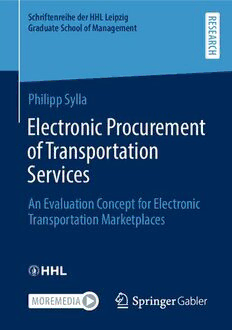
Electronic Procurement of Transportation Services: An Evaluation Concept for Electronic Transportation Marketplaces PDF
Preview Electronic Procurement of Transportation Services: An Evaluation Concept for Electronic Transportation Marketplaces
Schriftenreihe der HHL Leipzig Graduate School of Management Philipp Sylla Electronic Procurement of Transportation Services An Evaluation Concept for Electronic Transportation Marketplaces Schriftenreihe der HHL Leipzig Graduate School of Management Reiheherausgegebenvon StephanStubner,HandelshochschuleLeipzig,Leipzig,Germany In dieser Schriftenreihe werden aktuelle Forschungsergebnisse aus dem Bereich Unternehmensführung präsentiert. Die einzelnen Beiträge spiegeln die wis- senschaftlicheAusrichtungderHHLinForschungundLehrewider.Siezeichnen sich vor allem durch eine ganzheitliche, integrative Perspektive aus und sind durch den Anspruch geprägt, Theorie und Praxis zu verbinden sowie in beson- derem Maße internationale Aspekte einzubeziehen. Philipp Sylla Electronic Procurement of Transportation Services An Evaluation Concept for Electronic Transportation Marketplaces PhilippSylla Mannheim,Germany Leipzig,HHLLeipzigGraduateSchoolofManagement,Dissertation,2022 ISSN2628-1007 ISSN2628-1015 (electronic) SchriftenreihederHHLLeipzigGraduateSchoolofManagement ISBN978-3-658-40402-4 ISBN978-3-658-40403-1 (eBook) https://doi.org/10.1007/978-3-658-40403-1 ©TheEditor(s)(ifapplicable)andTheAuthor(s),underexclusivelicensetoSpringer FachmedienWiesbadenGmbH,partofSpringerNature2023 Thisworkissubjecttocopyright.AllrightsaresolelyandexclusivelylicensedbythePublisher, whetherthewholeorpartofthematerialisconcerned,specificallytherightsoftranslation,reprint- ing, reuse of illustrations, recitation, broadcasting, reproduction on microfilms or in any other physicalway,andtransmissionorinformationstorageandretrieval,electronicadaptation,computer software,orbysimilarordissimilarmethodologynowknownorhereafterdeveloped. Theuseofgeneraldescriptivenames,registerednames,trademarks,servicemarks,etc.inthis publicationdoesnotimply,evenintheabsenceofaspecificstatement,thatsuchnamesareexempt fromtherelevantprotectivelawsandregulationsandthereforefreeforgeneraluse. Thepublisher,theauthors,andtheeditorsaresafetoassumethattheadviceandinformationinthis bookarebelievedtobetrueandaccurateatthedateofpublication.Neitherthepublishernorthe authorsortheeditorsgiveawarranty,expressedorimplied,withrespecttothematerialcontained hereinorforanyerrorsoromissionsthatmayhavebeenmade.Thepublisherremainsneutralwith regardtojurisdictionalclaimsinpublishedmapsandinstitutionalaffiliations. This Springer Gabler imprint is published by the registered company Springer Fachmedien WiesbadenGmbH,partofSpringerNature. Theregisteredcompanyaddressis:Abraham-Lincoln-Str.46,65189Wiesbaden,Germany Foreword In a globalized business world characterized by a high degree of division of labor, the need for transportation of materials, parts, and modules up to finished productsisstateoftheart.Mostofthecompaniesoutsourcedistributionlogistics, i.e. transportation services to competent external partners. Therefore, transporta- tion costs manifest as an important factor in the context of price calculation and also influence the bottom line. The usage of electronic means for the procurement of products is already well known and significantly better studied in comparison to the e-procurement of transportation services via so called electronic transportation marketplaces (ETMs). For companies in the manufacturing, wholesale and retail business the reduction of e.g. transportation costs could be realized through such platforms. Yet the potentials are currently neither explored to an appropriate extent nor are related service evaluation approaches available to show the impact on the busi- nessvalueforinstance.ThosechallengesmakethetopicconsideredbyMr.Sylla highly relevant both from a theoretical as well as a practical perspective. Theobjectiveofthisdissertationaimsatclosingtheidentifiedgapsbycreating a corresponding innovative evaluation concept. The author provides in the present doctoral thesis with the step-by-step, theoretically- and empirically-based development of the evaluation concept, its elementsandproceduresanoutstandinganalyticalaswellasconceptualpersonal contribution.Fromacontent-relatedpointofview,theframeworkistobehonored as a pioneering achievement and the dissertation contains a lot of new findings v vi Foreword thatrepresentastartingpointforfurtherwork,predominantlyintheresearchand practice field of ETM evaluation, selection and usage that can be transferred to further use cases respectively domains. This book, which is based on a dissertation at the HHL Leipzig Graduate School of Management, is aimed equally at readers from science and practice. Leipzig Prof. Dr. Iris Hausladen November 2022 Preface It is an intriguing thought that electronic transportation marketplaces might opti- mize transportation activities with the invisible hand of the market. During my work as an IT specialist and project manager, however, I realized that prac- titioners still face considerable uncertainties for the assessment of the use of such marketplaces and the evaluation of their business value impacts. Therefore, this work intends to support decision-makers to make the right choices for such marketplaces. Thesuccessfulcompletionofthisthesiswouldnothavebeenpossiblewithout thesupportofvariouspeople.Firstandforemost,Iwouldliketothankmyadvi- sor Prof. Dr. Iris Hausladen for the always inspiring exchange of ideas and her valuable advice and suggestions. I would also like to provide deep appreciation to Prof. Dr. Erik Maier who reviewed this thesis as a second referee. Manyimportantinsightshavebeengainedintheempiricalstudyofthiswork. This would not have been possible without the support for the preliminary and mainstudywhichIreceivedfrommanyindividualsandcompanies.Iwould like to thank you all for your valuable contributions. Finally,Iamdeeplygratefulforthecontinuoussupportofmyfamily,friends, and my beloved Laura, especially for having the patience and understanding of the commitment made to this thesis. Therefore, I dedicate this book to you. Mannheim Philipp Sylla November 2022 vii Contents 1 Introduction .................................................. 1 1.1 Problem Statement ........................................ 1 1.2 Previous Research and Research Gaps ....................... 4 1.3 Purpose, Research Questions, and Structure .................. 7 2 FundamentalsfortheProcurementofTransportationServices .... 11 2.1 Transportation and Logistics ................................ 11 2.1.1 Basic Definitions and Positioning ..................... 11 2.1.2 Transportation within Business Logistics .............. 13 2.1.2.1 Links to Business Processes ................. 13 2.1.2.2 Interdependencies with Logistics Planning ..... 14 2.2 Basics of Road Transportation .............................. 16 2.2.1 Justification for the Focus on Road Transportation ...... 16 2.2.2 Vehicles and Logistics Units ......................... 17 2.2.3 Processes .......................................... 20 2.3 Procurement of Transportation Services ...................... 21 2.3.1 Objectives ......................................... 21 2.3.2 Involved Parties .................................... 22 2.3.3 Procurement Processes .............................. 24 2.3.3.1 Spot Market Procurement ................... 25 2.3.3.2 Contract Market Procurement ................ 26 3 ElectronicTransportationMarketplaces ......................... 29 3.1 Basic Terminology ........................................ 29 3.1.1 E-procurement and Related Terms .................... 29 3.1.2 Electronic Marketplaces ............................. 30 3.1.3 Electronic Transportation Marketplaces ................ 33 ix x Contents 3.2 Historical Development .................................... 34 3.3 Classification ............................................. 35 3.3.1 Participants ........................................ 35 3.3.2 Nature of Exchanged Transportation Services .......... 38 3.3.3 Ownership and Bias ................................ 39 3.4 Definition of the Term for This Work ....................... 40 3.4.1 Definition ......................................... 40 3.4.2 Demarcations ...................................... 41 3.5 Functionalities ............................................ 42 3.5.1 Main Functionalities ................................ 43 3.5.1.1 Spot Market Functionalities .................. 43 3.5.1.1.1 Bulletin Board ................... 43 3.5.1.1.2 Instant Quoting ................... 44 3.5.1.1.3 Reverse Auction .................. 44 3.5.1.2 Contract Market Functionalities .............. 45 3.5.1.2.1 E-tendering ...................... 45 3.5.1.2.2 Electronic Transport Order ......... 45 3.5.2 Additional Functionalities ........................... 46 3.5.2.1 Time-slot Management ...................... 47 3.5.2.2 Tracking and Tracing ....................... 47 3.5.2.3 Document Management ..................... 48 3.5.2.4 Support of Invoice Settlement ................ 48 3.5.2.5 System Integration ......................... 49 4 ConceptualResearchFramework ............................... 51 4.1 Background .............................................. 51 4.1.1 Objectives ......................................... 51 4.1.2 Contingency Approach as the Theoretical Foundation ... 52 4.1.3 Structure and Further Procedure ...................... 54 4.2 Design Variables .......................................... 55 4.2.1 Identification of Design Variable Dimensions .......... 55 4.2.2 Dimension 1: System Use ........................... 57 4.2.2.1 Adoption .................................. 57 4.2.2.2 Extent of Use .............................. 58 4.2.2.3 Functionality Choice ........................ 59 4.2.2.4 Relational Orientation ....................... 59 4.2.3 Dimension 2: Relationship to ETMs .................. 65 4.2.3.1 Selection of an ETM ....................... 65
